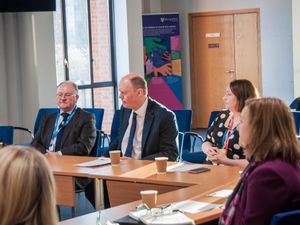Patients lose 123st in diabetes battles in NHS prevention programme
People finishing a major NHS diabetes prevention programme have lost 782kg – equivalent to about 123 stone – between them.
Some of those helping to contribute are retired nurse Ruth Ellis, from Weston Rhyn in Shropshire, who has lost almost 13kg in five months and Lea Anderson, from Hanley in Staffordshire who has lost 25.5kg since starting the programme at the beginning of 2019.
Around four million people in the UK live with type two diabetes – with diabetes and its complications costing the NHS more than £10 billion to treat every year.
Nationally, 89,604 people have now finished the programme, losing a combined weight of 185,051kg, equivalent to the weight of 43 ambulances. In Shropshire and Staffordshire, 355 people have completed the programme with many more part way through.
The world-first service is the first of its kind to have achieved a full national roll-out.
With expert advice on dieting, exercise and healthy lifestyle, the programme will double in size to treat around 200,000 people every year as part of the NHS Long Term Plan.
Complications from the disease can include blindness and foot amputations.
Around nine out of 10 people with diabetes have type two and there were more than a million obesity diagnoses in hospital patients last year. Projections show that the growing number of people with diabetes could result in nearly 39,000 people living with diabetes suffering a heart attack in 2035 and more than 50,000 people suffering a stroke, and one in six hospital beds occupied with someone with diabetes.
Life-saving
A lack of exercise, poor diet and being overweight are all risk factors for developing the disease. Ruth, who is 75 and a great-grandmother, confesses that she had developed habits that led to weight gain and less physical activity.
She said: “I lost two stones in five months and my blood sugars have decreased putting me at a lower risk of diabetes. I have changed my eating habits and no longer have a biscuit with my tea, don’t eat cake or sweets and keep my portions controlled. I don’t buy ready-meals and I diligently read labels.”
Lea who is a primary school teacher found out he was at high risk of type two diabetes following a routine blood test.
He said: “When I thought about it, it made sense. I weighed 19 stones and had always been overweight. I am pleased to say I have lost four stones in six months and am pleased to say it was easier than I thought – especially as I didn’t have to restrict myself to lettuce every day.”
Professor Vinod Patel, clinical director for diabetes at NHS England and NHS Improvement in the West Midlands said: “Around two-thirds of adults and one-third of children are now overweight or obese, driving higher and higher rates of type two diabetes that we are now focusing huge efforts to prevent as part of our NHS Long Term Plan.
“Helping people avoid diabetes is potentially life-saving, so these results are encouraging, but ultimately the NHS cannot win the fight against obesity alone, which is why we are providing people with the tools to help themselves – changing lives and freeing up vital NHS resources.”
The increasing numbers of people receiving help from the programme come alongside an announcement last year that people can now benefit from digital services, including wearable tech and online peer support groups, to help more people to benefit from the programme.




